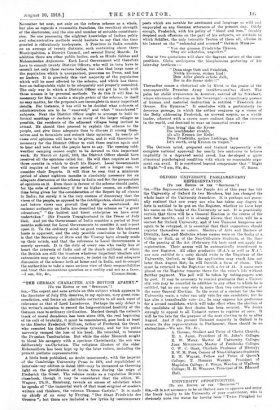"THE GERMAN CHARACTER AND BRITISH APATHY." (To THE EDBTOR OT
THE " SPECTATOR."]
SIR,—The cogent and sane article on this subject which appears in the Spectator of July 27th deserves, in my opinion, very great com- mendation, and forms an admirable corrective to all such want of relevance as that of Lord Lansdowne. Perhaps its only defect is the writer's omission to yeoord the long-continued hostility of the German race to ordinary civilization. Marked though the nation's track of moral decedence has been since 1870, the real beginning of its oult of brutality, it must be remembered, goes back at least to the Elector Frederick William, father of Frederick the Great, who resented his father's atrocious tyranny, and for his pains narrowly escaped the loss of his head. He recanted, to become the Prussian Tamburlaine. But while the older Monarch bought to blend his savagery with a epecious Christianity, the son was deliberately un-Christian. The religious illusion of the older Hohenzollern has been kept up by the later rulers, including the present pietistic representative.
A little book published, no doubt ienocuously, with the imprint of the Cambridge University Press in 1876, and republished at intervals—my edition is dated 1899—may be instanced as throwing light on the glorification of brute force during the reign of Frederick the Great. The volume ranks as a regulation British class-book, though it may be considered that the editor, W. Wagner, Ph.D., Hamburg, reveals an excess of adulation when he speaks of "the immortal work of that most original of modern writers and thinkers, the veteran Thomas Carlyle." It is made up chiefly of an essay by Freytag, "Der Sleet Friedrichs des Grossen "; but there are included a few lyrics by contemporary poets which are notable for sentiment and language as wild and empurpled as any German utterance of the present day. Oddly enough, Frederick, with his policy of "blood and iron," frankly despised such effusions on the part of his subjects, an attitude to which Schiller, the only tolerable Teuton of them all, alludes in his lament on the "unheeded and scorned" German Muse:— " Von der grossen Friedrichs Throne, Ging sic schutzlos, ungeehrt."
One or two quotations will show the flagrant nature of the com- positions. Gleim anticipates the blasphemous posturing of his later-day brethren :— "Dana singe Gott und Friedrich. Nichts kleiners, &Wises Lied! Dem Adler gleich erhebe dioh, Der in die Sonne sieht ! I" Thereafter comes a rhetorical ode by Kleist to the praise of the unconquerable Prussian Army (unilber wund'nes Hoer). The palm for stolid irreverence is, however, carried off by Schubert, whose strenuous reflection on his Sovereign's extraordinary powers of human and material destruction is entitled "Friedrich der Grosse. Ein Hymnus." It concludes with a particularly in- decorous paseage, in which the author conjures up a vision of the Deity addressing Frederick, an avowed sceptic, as a world- leader, adorned with a crown more radiant than all the crowns ih the world, and destined to wear an immortal crown :—
" Man bring' iiuu die Krone
Die leuohtender strahlt, Als elle Kronen der Erde!
Denn Friedrichs, meines Lieblings, Geist Ist's werth, ewig Kronen an tragen."
The German mind, prepared and trained (apparently with complete national approval) for nearly two centuries to believe implicitly in a depraved social creed, hes developed a quite abnormal psychological condition with which no reasonable argu- ment can avail. It is convinced beyond compromise that "Might


































 Previous page
Previous page